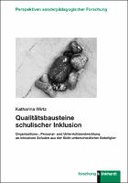Explore

Qualitätsbausteine schulischer Inklusion
Katharina Wirtz
2020
0 Ungluers have
Faved this Work
Login to Fave
"As a result of the UN-Convention on the Rights of Persons with Disabilities schools are faced with the challenge to develop inclusive education for pupils with and without special educational needs. This doctoral thesis puts its focus on the question, which elements of quality play an important role concerning the reorganization of the educational system in Germany into an inclusive one. To be able to embed these elements including organizational change, personnel development and the development of teaching in a theoretical framework the second chapter first of all describes historical aspects of inclusive schooling in Germany during the last decades as well as different viewpoints of scientific theories. It seems obvious that reform processes can be compared to wave movements, which end up in restorative efforts after an initial swing of reforms. In addition, demands for inclusive education from the 70s are surprisingly unchanged in the
current discourse. Different scientific theories (sociology, educational sociology, theories of education and special education) shape this discourse by a various understanding and use of terms like exclusion and inclusion. The analysis of this scientific discussion leads to the conclusion that attending a so-called „inclusive school“ is not to be equated with the social inclusion of children and young people in general. In the third chapter empirical research concerning the quality of inclusive education from two scientific viewpoints is brought together: the view of special pedagogy and the view of research on schools and teaching in general. Categories, sub-categories and indicators of this quality in the fields of organization, personnel and teaching of (inclusive) schools are collected, systematically structured and weighted by a qualitative and quantitative content analysis of the previous research literature. This approach results in a system of categories that gives an overview about this complex research field and provides a basis for further research.
The results of two surveys, which have been carried out in the federal state of Saarland, are described and interpreted in the fourth chapter. In this state inclusive education has been practiced for more than thirty years. The qualitative sub-study includes 25 interviews, the quantitative sub-study involves 32 primary and secondary schools as well as four support- and advice centres for inclusive education. Both surveys analyse the perception und evaluation of the quality of inclusion from multiple perspectives: the views of headmasters, mainstream and special school teachers, parents of children with special educational needs and the viewpoints of the pupils themselves. Describing the connections between those different perspectives gives a deep insight into the inner life of inclusive schools.
Conclusions for the development of individual schools as well as for the education system as a whole are derived from the results of the studies. Moreover those conclusions are critically classified against the background of the theoretical framework that has been described in the second chapter."
This book is included in DOAB.
Why read this book? Have your say.
You must be logged in to comment.
Rights Information
Are you the author or publisher of this work? If so, you can claim it as yours by registering as an Unglue.it rights holder.Downloads
This work has been downloaded 42 times via unglue.it ebook links.
- 42 - pdf (CC BY-NC-SA) at OAPEN Library.
Keywords
- Education
- Educational strategies & policy
- Inclusive education / mainstreaming
- Society & Social Sciences
- thema EDItEUR::J Society and Social Sciences::JN Education::JNF Educational strategies and policy::JNFK Educational strategies and policy: inclusion
Links
DOI: 10.35468/5848Editions

